
Disclosure regarding our editorial content standards.
Losing a spouse is not only tremendously difficult to process, but it also entails a lot of practical struggles. Fortunately, government and nonprofit programs can help supplement your income and provide assistance with housing, food and medical costs. Additionally, there are some benefits specifically tailored to widows of veterans and widows with children.
While grieving takes time, financial help for widows can provide support at a crucial moment.
If you’ve recently lost your spouse and need immediate financial assistance, read below for a list of programs and organizations that may be able to help. If you’re looking for specific support, click one of the links below to jump directly to the section you need.
- Social Security
- Family support
- Medical assistance
- Housing assistance
- Food assistance
- Managing debt
- Credit counseling and tax preparation
- Widows with children
- Widows of veterans
- Non-financial resources
Social Security
The Social Security Administration provides survivor benefits for widows, including both a lump-sum payment and ongoing benefits for those who qualify.
The lump-sum payment amounts to $255 in 2021, while monthly payments can be up to several thousand dollars. A widow who retires at age 70 can receive up to $3,895 each month in Social Security payments in 2021.
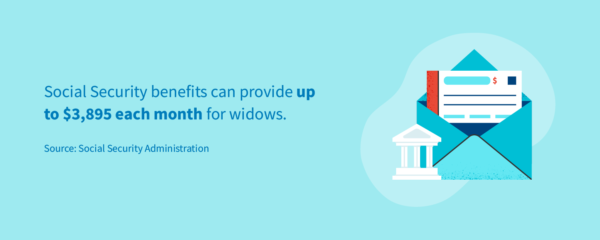
Here’s how to know if you may be eligible for Social Security benefits:
- You are over the age of 60, or over the age of 50 with a disability. In this case, you’d likely be able to claim a monthly Social Security check.
- You are providing for a minor or disabled child of the deceased spouse. The Social Security Administration provides benefits to help you support the child.
- Even if you and your spouse were divorced, you may receive benefits. Depending on how long you were married and when you were divorced, you may still receive survivor benefits when your spouse dies.
The survivor benefits scale depending on the age of the recipient, the number of years the deceased spouse worked and the circumstances of the widow or any children.
To claim Social Security benefits, you’ll need to make an appointment and visit your local Social Security Administration office—benefits cannot be claimed online or over the phone.
Family support
Often, a widow’s family members are most willing to help—and in many cases, they are able to do so as well. Many children are in their prime earning years when their parents die, which means that they could provide some financial support to help a widow in a crucial time.
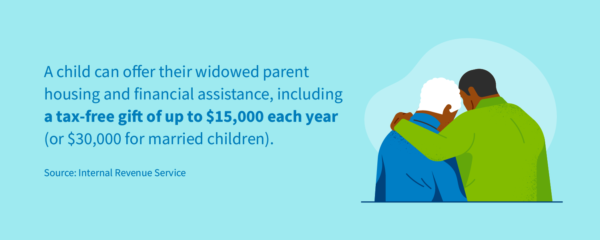
Federal tax law allows for an individual child to give their widowed parent up to $15,000 each year without a tax burden, and a married couple is able to give up to $30,000. Because sharing money within a family can be difficult, it’s important that everyone understands whether this money is a gift or a zero-interest loan.
Even if money is tight within a family, many people are still often able to provide their grieving parent with a place to stay either temporarily or long term.
Medical assistance
Widows who are struggling with their own health issues can find a variety of resources to provide reduced-cost or free healthcare.
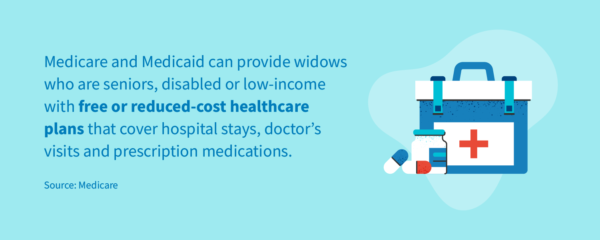
Here are some of the options to explore:
- Government benefits: Use the survey at Benefits.gov to determine your eligibility for healthcare programs like Medicare and Medicaid, which provide low-cost alternatives for managing your health.
- United Way: You can work with a local United Way branch (there are more than 1,800) to get connected with local services for your health needs.
- Free clinics: Find free medical or dental treatment through the National Association of Free & Charitable Clinics.
- Low-cost medications: The organization NeedyMeds can help you find state-sponsored programs for low-cost medications you may need to manage a health condition.
There are thousands of programs nationwide to support widows managing specific health conditions or provide ongoing medical, dental and vision care to those who have lost a spouse.
Housing assistance
For widows who need help finding housing or paying for their current housing, several government programs and nonprofit organizations can offer support. Support from the Department of Housing and Urban Development can potentially limit housing costs to 30 percent of monthly adjusted income.
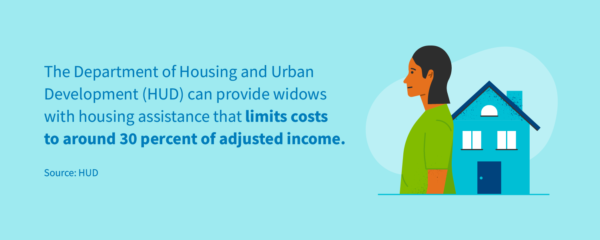
Look at some of the following resources to get assistance with housing:
- Department of Housing and Urban Development (HUD): The federal government sponsors a variety of housing programs through HUD, including public housing, rental assistance, housing vouchers, foreclosure assistance and temporary shelter.
- Emergency Food and Shelter Program: As part of United Way, this program helps people find housing in dire situations.
- Rebuilding Together: A nonprofit organization called Rebuilding Together may be able to help with critical repairs and improvements for your house.
With local and federal support, it’s possible to continue to afford your housing or find a suitable alternative in a difficult time.
Food assistance
If you are struggling to pay for food or have immediate food needs, programs exist to support widows in difficult financial situations.
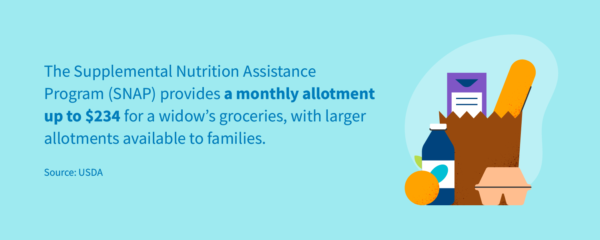
The following programs and organizations may be able to help:
- USDA National Hunger Hotline: For immediate and urgent needs, call the National Hunger Hotline on weekdays to get connected with local resources.
- SNAP benefits: The federal government’s Supplemental Nutrition Assistance Program (SNAP) provides financial support for anyone who cannot afford food. You can find information about general assistance as well as assistance for elderly or disabled people after checking eligibility requirements.
- Local food banks: You can use the search tool provided by Feeding America to find a local food bank in your area that can provide for you.
- Religious organizations: Many local churches, mosques and synagogues provide food for those in need. A prominent Catholic organization, the Society of St. Vincent de Paul, can help you find local programs for food, housing, medication and clothing.
If you are struggling with the loss of your spouse and cannot provide food for yourself at the moment, reach out right away to one of the organizations above to get the support you need.
Managing debt
After your spouse dies, you may find yourself overwhelmed by debt—from credit cards, medical bills, a mortgage or other loans.
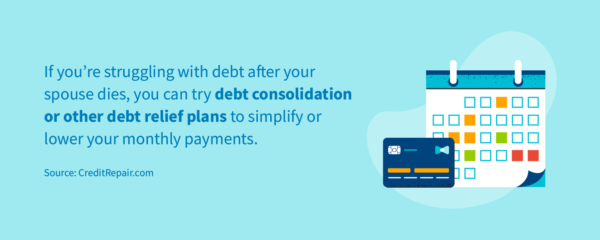
While many people think that debt disappears after you die, that isn’t always the case. You may be responsible for your spouse’s debt in either of the following situations:
- You cosigned on a loan or credit card: If your name is on a loan or credit card, you’re responsible for paying it back, even if you didn’t personally use it.
- You live in a community property state: Some states, including California, Texas and several others, have laws that indicate any debt acquired during a marriage belongs to both partners equally.
Since estate law varies from one place to another, it’s important to consult an attorney to determine which debt you actually owe.
If you’re struggling to pay debt after losing your spouse, consider some of the following options:
- Debt consolidation: With a debt consolidation program, you can simplify and potentially lower your monthly payments.
- Debt relief: Other kinds of debt relief, like balance transfer cards or debt counseling, also offer a less stressful path out of debt.
- Special programs for seniors: Programs aimed specifically at seniors can provide financial resources for getting debt under control.
No matter what kind of debt you’re dealing with after losing your partner, it’s possible to get your financial life back on track.
Credit counseling and tax preparation
For widows who need support filing their taxes or managing their credit, there are programs that offer free services.
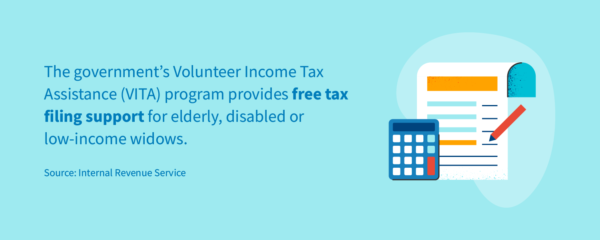
Consider reaching out to some of the following programs:
- Tax preparation: For those who are elderly, disabled or low-income, the IRS can connect you with volunteers who can help you file your taxes for free.
- Credit counseling: The federal government provides information about finding a credit counselor who can help you develop a debt management plan.
- Financial coaching: The public charity Wings for Widows offers free financial education to empower you to manage your money after the death of your spouse.
Taking advantage of these resources can be a vital lifeline as you adjust to your new financial life without your spouse.
Widows with children
For widows with children or who are pregnant, there are special programs to help you take care of your kids despite financial difficulties.
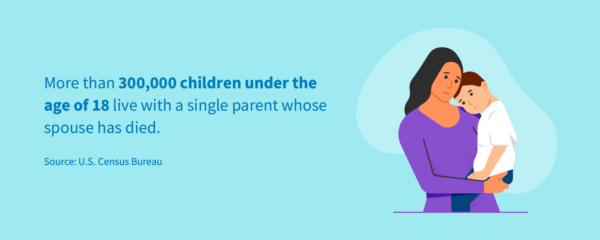
Reach out to any of the following organizations for support:
- Health insurance: You can find free or low-cost health insurance through the state-sponsored Children’s Health Insurance Program (CHIP).
- Prenatal care: Support for pregnant women is available through the federal government’s Department of Health and Human Services.
- Special needs: For a widow who is the parent of a child with special needs, Family Voices can connect you with resources tailored to the needs of your child.
- Food assistance: The federal government’s Special Supplemental Nutrition Program for Women, Infants, and Children (WIC) helps provide food for low-income widows with children.
- Financial assistance: The Liz Logelin Foundation supplies grants to support widows with children who may need immediate assistance.
Utilize these programs to help provide for your children as you work through the hardship of losing your spouse.
Widows of veterans
Widows of veterans may be eligible for special benefits to support themselves after the loss of their spouse. The potentially includes a payment of $100,000 to widows whose partners died in the line of duty.
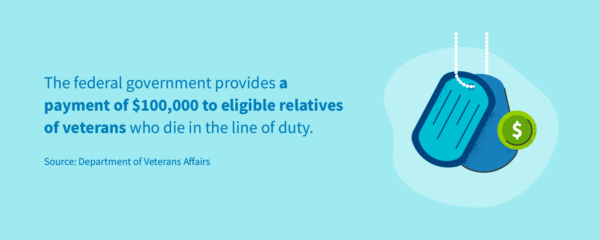
Information about all of the following resources for widows of military service members can be found on the Department of Veterans Affairs (VA) website.
The VA may be able to provide you with some of the following benefits, depending on your particular circumstance:
- Burial assistance
- Healthcare
- Education and training
- Life insurance
- Survivors pension
- Compensation for those whose spouse died in the line of duty
Contact the Department of Veterans Affairs to see which benefits you may be eligible for as the widow of a military veteran.
Non-financial resources
In addition to the financial burdens of losing your spouse, there are tremendous emotional hurdles to overcome. This is especially true for older women, as 58 percent of those over the age of 75 have experienced the loss of a spouse.
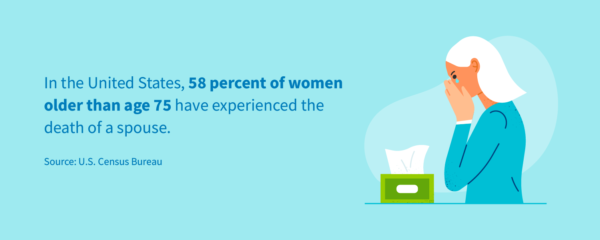
You can reach out to any of these organizations to get support with the process of grieving the death of your spouse.
- The W Connection: The W Connection offers peer-to-peer support groups where widows can connect and offer resources to each other.
- Open to Hope: The nonprofit organization Open to Hope provides articles, podcasts, books and other resources to support widows.
- Open Path Collective: The low-cost therapy network Open Path Collective can connect you with a grief counselor on a sliding fee scale.
- Grief support groups: The online grief support groups provided by GriefNet.org operate every hour, every day of the year.
Losing a spouse is one of life’s most difficult challenges. Whether you were married for decades or became a widow at a young age, processing the loss of your closest partner is an enormous struggle.
When you’re also struggling financially, the emotional burden can continue to weigh on you as you manage difficulties with housing, food, debt, credit or childcare. As you continue your journey, use the resources above to get the support you need to work through this challenging time.






